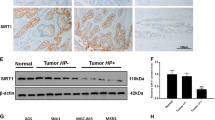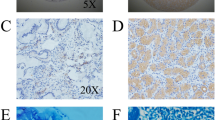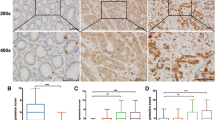Abstract
This article aimed to investigate the mechanism of miR-375 in Hp-induced gastric cancer cells (GCCs) model. Human normal gastric mucosal epithelial cell (GMEC) line GES-1 and human GCCs strain MKN45 were used as research objects. The expression of miR-375 was detected after H.pylori (Hp) infection of GCCs. The cell activity was detected by, 53-(4,5-dimethylthiazol-2-yl)-2,5-diphenyltetrazolium bromide (MTT) method, and the cell multiplication was determined by cell counting kit-8 (CCK-8) method. Transwell assay was used to detect the effect of cell invasion and migration ability. The expression levels of JAK1 and STAT3 proteins were determined by Western blot (WB). MiR-375 was increased in GCCs after Hp infection, and JAK1, STAT3, p-JAK1, and p-STAT3 in GCCs after Hp infection were visibly increased. In addition, the overexpressed miR-375 promoted the multiplication activity, migration, and invasion ability of GCCs. MiR-375 promotes Hp-induced migration and invasion of GCCs by targeting JAK1/STAT3. This article reveals the important role of miR-375 in Hp-induced GC, which provides new clues for further study of its mechanism and therapeutic targets.
Similar content being viewed by others
Data availability
The original contributions presented in the study are included in the article.
References
Ajani, J. A., D’Amico, T. A., Bentrem, D. J., Chao, J., Cooke, D., Corvera, C., Das, P., Enzinger, P. C., Enzler, T., Fanta, P., Farjah, F., Gerdes, H., Gibson, M. K., Hochwald, S., Hofstetter, W. L., Ilson, D. H., Keswani, R. N., Kim, S., Kleinberg, L. R., Klempner, S. J., Lacy, J., Ly, Q. P., Matkowskyj, K. A., McNamara, M., Mulcahy, M. F., Outlaw, D., Park, H., Perry, K. A., Pimiento, J., Poultsides, G. A., Reznik, S., Roses, R. E., Strong, V. E., Su, S., Wang, H. L., Wiesner, G., Willett, C. G., Yakoub, D., Yoon, H., McMillian, N., & Pluchino, L. A. (2022). Gastric cancer, version 2.2022, NCCN clinical practice guidelines in oncology. Journal of the National Comprehensive Cancer Network: JNCCN, 20(2), 167–192.
Liou, J. M., Malfertheiner, P., Lee, Y. C., Sheu, B. S., Sugano, K., Cheng, H. C., Yeoh, K. G., Hsu, P. I., Goh, K. L., Mahachai, V., Gotoda, T., Chang, W. L., Chen, M. J., Chiang, T. H., Chen, C. C., Wu, C. Y., Leow, A. H., Wu, J. Y., Wu, D. C., Hong, T. C., Lu, H., Yamaoka, Y., Megraud, F., Chan, F. K. L., Sung, J. J., Lin, J. T., Graham, D. Y., Wu, M. S., El-Omar, E. M., & Asian Pacific Alliance on Helicobacter and Microbiota (APAHAM). (2020). Screening and eradication of helicobacter pylori for gastric cancer prevention: the Taipei global consensus. Gut, 69(12), 2093–2112.
Yang, W. J., Zhao, H. P., Yu, Y., Wang, J. H., Guo, L., Liu, J. Y., Pu, J., & Lv, J. (2023). Updates on global epidemiology, risk and prognostic factors of gastric cancer. World Journal of Gastroenterology, 29(16), 2452–2468.
Scida, S., Russo, M., Miraglia, C., Leandro, G., Franzoni, L., Meschi, T., De’ Angelis, G. L., & Di Mario, F. (2018). Relationship between Helicobacter pylori infection and GERD. Acta Biomedica, 89(8-S), 40–43.
Salvatori, S., Marafini, I., Laudisi, F., Monteleone, G., & Stolfi, C. (2023). Helicobacter pylori and gastric cancer: pathogenetic mechanisms. International Journal of Molecular Sciences, 24(3), 2895.
Ni, H. K., Liao, L. M., Huang, R. L., & Zhou, W. (2020). The relationship between gastric cancer and helicobacter pylori cytotoxin-related gene a genotypes. Cellular and Molecular Biology, 66(7), 1–4.
Talayev, V. Y., Svetlova, M. V., Zaichenko, I. E., Voronina, E. V., Babaykina, O. N., Neumoina, N. V., Perfilova, K. M., Utkin, O. V., & Filatova, E. N. (2021). Cytokine profile of CCR6+ T-Helpers isolated from the blood of patients with peptic ulcer associated with helicobacter pylori infection. Sovremennye Tekhnologii v Meditsine, 12(3), 33–39.
Ni, H., Qin, H., Sun, C., Liu, Y., Ruan, G., Guo, Q., Xi, T., Xing, Y., & Zheng, L. (2021). MiR-375 reduces the stemness of gastric cancer cells through triggering ferroptosis. Stem Cell Research & Therapy, 12(1), 325.
Zhang, Z., Chen, S., Fan, M., Ruan, G., Xi, T., Zheng, L., Guo, L., Ye, F., & Xing, Y. (2021). Helicobacter pylori induces gastric cancer via down-regulating miR-375 to inhibit dendritic cell maturation. Helicobacter, 26(4), e12813.
Prinz, C., Mese, K., & Weber, D. (2021). MicroRNA changes in gastric carcinogenesis: differential dysregulation during helicobacter pylori and EBVinfection. Genes, 12(4), 597.
Wei, R., Yang, Q., Han, B., Li, Y., Yao, K., Yang, X., Chen, Z., Yang, S., Zhou, J., Li, M., Yu, H., Yu, M., & Cui, Q. (2017). MicroRNA-375 inhibits colorectal cancer cells proliferation by downregulating JAK2/STAT3 and MAP3K8/ERK signaling pathways. Oncotarget, 8(10), 16633–16641.
Chen, L., He, Y., Zhu, J., Zhao, S., Qi, S., Chen, X., Zhang, H., Ni, Z., Zhou, Y., Chen, G., Liu, S., & Xie, T. (2023). The roles and mechanism of m6A RNA methylation regulators in cancer immunity. Biomed Pharmacother, 163, 114839.
Lan, J., Chen, L., Li, Z., Liu, L., Zeng, R., He, Y., Shen, Y., Zhang, T., & Ding, Y. (2024). Multifunctional biomimetic liposomes with improved tumor-targeting for TNBC treatment by combination of chemotherapy, antiangiogenesis and immunotherapy. Advanced Healthcare Materials. e2400046. https://doi.org/10.1002/adhm.202400046
Ashrafizadeh, M., Dai, J., Torabian, P., Nabavi, N., Aref, A. R., Aljabali, A. A. A., Tambuwala, M., & Zhu, M. (2024). Circular RNAs in EMT-driven metastasis regulation: modulation of cancer cell plasticity, tumorigenesis and therapy resistance. Cellular and Molecular Life Science, 81(1), 214.
Nasimi Shad, A., Fanoodi, A., Maharati, A., Akhlaghipour, I., & Moghbeli, M. (2023). Molecular mechanisms of microRNA-301a during tumor progression and metastasis. Pathology Research and Practice, 247, 154538.
Mo, Y., Leung, L. L., Mak, C. S. L., Wang, X., Chan, W. S., Hui, L. M. N., Tang, H. W. M., Siu, M. K. Y., Sharma, R., Xu, D., Tsui, S. K. W., Ngan, H. Y. S., Yung, M. M. H., Chan, K. K. L., & Chan, D. W. (2023). Tumor-secreted exosomal miR-141 activates tumor-stroma interactions and controls premetastatic niche formation in ovarian cancer metastasis. Molecular Cancer, 22(1), 4.
Wang, C., Zhou, M., Zhu, P., Ju, C., Sheng, J., Du, D., Wan, J., Yin, H., Xing, Y., Li, H., He, J., & He, F. (2022). IGF2BP2-induced circRUNX1 facilitates the growth and metastasis of esophageal squamous cell carcinoma through miR-449b-5p/FOXP3 axis. Journal of Experimental & Clinical Cancer Research, 41(1), 347.
Ahmed, E. A., Rajendran, P., & Scherthan, H. (2022). The microRNA-202 as a diagnostic biomarker and a potential tumor suppressor. International Journal of Molecular Sciences, 23(11), 5870.
Sendi, H., Yazdimamaghani, M., Hu, M., Sultanpuram, N., Wang, J., Moody, A. S., McCabe, E., Zhang, J., Graboski, A., Li, L., Rojas, J. D., Dayton, P. A., Huang, L., & Wang, A. Z. (2022). Nanoparticle delivery of miR-122 inhibits colorectal cancer liver metastasis. Cancer Research, 82(1), 105–113.
Liu, J., Yang, H., Deng, J., Jiang, R., Meng, E., & Wu, H. (2023). CircRPPH1 promotes the stemness of gastric cancer cells by targeting miR-375/SLC7A11 axis. Environmental Toxicology, 38(1), 115–125.
Miao, Z., Li, J., Wang, Y., Shi, M., Gu, X., Zhang, X., Wei, F., Tang, X., Zheng, L., & Xing, Y. (2023). Hsa_circ_0136666 stimulates gastric cancer progression and tumor immune escape by regulating the miR-375/PRKDC Axis and PD-L1 phosphorylation. Molecular Cancer, 22(1), 205 (1-19).
Qi, C., Liu, L., Wang, J., & Jin, Y. (2023). Up-regulation of microRNA-183 reduces FOXO1 expression in gastric cancer patients with Helicobacter pylori infection. Histology and Histopathology, 38(11), 1349–1357.
Liu, Y., Cao, J., Yang, Q., Zhu, L., Zhao, W., Wang, X., Yao, J., Zhou, Y., & Shao, S. (2023). CircRNA_15430 reduced by Helicobacter pylori infection and suppressed gastric cancer progression via miR-382-5p/ZCCHC14 axis. Biology Direct, 18(1), 51.
Li, X., Zhu, M., Zhao, G., Zhou, A., Min, L., Liu, S., Zhang, N., Zhu, S., Guo, Q., Zhang, S., & Li, P. (2022). MiR-1298-5p level downregulation induced by Helicobacter pylori infection inhibits autophagy and promotes gastric cancer development by targeting MAP2K6. Cellular Signalling, 93, 110286.
Zhang, Z., Sun, C., Zheng, Y., & Gong, Y. (2022). circFCHO2 promotes gastric cancer progression by activating the JAK1/STAT3 pathway via sponging miR-194-5p. Cell Cycle, 21(20), 2145–2164.
Li, L., Xiao, C., He, K., & Xiang, G. (2021). Circ_0072088 promotes progression of hepatocellular carcinoma by activating JAK2/STAT3 signaling pathway via miR-375. International Union of Biochemistry and Molecular Biology Life, 73(9), 1153–1165.
Wu, K., Liu, F., Zhang, T., Zhou, Z., Yu, S., Quan, Y., & Zhu, S. (2022). miR-375 suppresses the growth and metastasis of esophageal squamous cell carcinoma by targeting PRDX1. Journal of Gastrointestinal Oncology, 13(5), 2154–2168.
Tu, H. F., Chang, K. W., Lin, S. C., Hung, W. W., Ji, S. H., Wu, H. L., & Liu, C. J. (2022). Aberrant miR-10b, miR-372, and miR-375 expression in the cytobrushed samples from oral potentially malignant disorders. Journal of Dental Sciences, 17(2), 688–695.
Author information
Authors and Affiliations
Contributions
Z.M., X.W., Y.Z., F.Y., Q.Q., and R.J. participated the search and collection data, drafting of the manuscript; study concept and design, study supervision. All authors read and approved the final manuscript.
Corresponding author
Ethics declarations
Conflict of interest
The authors declare no competing interests.
Additional information
Publisher’s note Springer Nature remains neutral with regard to jurisdictional claims in published maps and institutional affiliations.
Rights and permissions
Springer Nature or its licensor (e.g. a society or other partner) holds exclusive rights to this article under a publishing agreement with the author(s) or other rightsholder(s); author self-archiving of the accepted manuscript version of this article is solely governed by the terms of such publishing agreement and applicable law.
About this article
Cite this article
Mao, Z., Wang, X., Zhao, Y. et al. The Role of MiR-375 in Migration and Invasion of H.pylori-induced Gastric Cancer Cell Model. Cell Biochem Biophys 83, 429–435 (2025). https://doi.org/10.1007/s12013-024-01473-9
Accepted:
Published:
Issue Date:
DOI: https://doi.org/10.1007/s12013-024-01473-9




